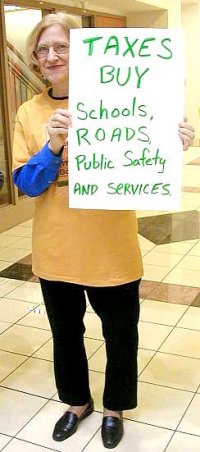Tax commission proposals support more revenue but also more regressivity

The Blue Ribbon Commission on Tax Reform met Monday and worked through a lot more options for reforming the state’s tax code. The group is nearing completion of its work, but still has some important decisions to make.
As in recent meetings, the commissioners adopted some recommendations that would move Kentucky’s tax system closer to the principles of adequacy and elasticity (grows as the economy grows), but at the same time did that in ways that would make the system overall more regressive and thus less fair to lower and middle incomes.
“In previous meetings, I’ve seen a few encouraging signs that the commission is paying attention to KFTC’s point that healthy communities benefit all of us,” said Louisville member Linda Stettenbenz. “They all seem to be on board now with the idea that a state EITC [Earned Income Tax Credit] will be a pay increase for workers, and that funding for education helps business get skilled workers.
“And in this meeting, too, there were a couple of okay moments. It was good that they took a sales tax increase off the table right away.”
But other recommendations would impact lower and middle incomes more than upper incomes. They include a 1 percent utility tax on residences and businesses, local option sales taxes and an increase in taxes on tobacco products.
Commissioner Jason Bailey of the Kentucky Center for Economic Policy explained that utility taxes are “regressive overall because [utility] rates are higher for residential customers than industrial or commercial.” He added that “a legacy of our low electricity rates is we tend to have leaky housing,” and therefore higher than average fuel consumption for those living in inadequate housing.
The revenue from the utility tax was designated to the Support Education Excellence in Kentucky (SEEK) program. Currently, school districts can (and most do) place up to a 3 percent tax on utilities bills, with that revenue going to local schools.
There was strong support for increasing the tax on cigarettes and other tobacco products. After voting down a proposal to increase the tax per pack from 60 cents to $1.60, they agreed to a 40-cent increase, or $1 per pack.
Some commissioners stated support for an increased cigarette tax from a pro-health point of view, and therefore wanted a higher tax to achieve “sticker shock at point of purchase.”
“This is the only tax that we can recommend that has a clearly documented health benefit,” said commission member Sheila Schuster. She noted that youth and pregnant woman are particularly sensitive groups. “We need to keep kids from ever starting.”
However, the higher tax lost on a 5-7 vote because of an estimate that a tax that high would decrease smoking to the point that there would also be a decrease in revenue. The lower rate of $1 per pack is thought to not have the same effect – in part because some neighboring states have a comparable rate – and could increase revenues by more than $100 million.
Other recommendations by the commission included:
- not establishing a stand-alone Kentucky estate tax (keep it coupled to the federal tax code, which means any revenue for Kentucky is determined by Congress; currently we get zero)
- taking away the recall provisions if revenue growth for local taxing districts exceeds 4 percent in a given year
- freezing the state property tax rate at 12 cents per $100 value (otherwise it would keep eroding – it once was 31.5 cents)
- keeping the Homestead Exemption for senior citizens
- extending the sales tax exemption for livestock feed to feed for horses
- continuing to exempt horses bought at auction from sales tax
- refusing to sunset tax incentives used for economic development and other purposes (have automatically expire after a certain number of years unless re-authorized by the General Assembly).
Many of these choices were frustrating for Stettenbenz who believes that some of the “commissioners who show up are looking for low-hanging fruit by nickel-and-diming struggling people and refusing to level the playing field for small business by demanding accountability for corporate incentives. For the most part, they are not living up to their charge of looking at the larger picture, the one that clearly shows this state at the bottom of economic well-being and quality of life. The one that shows a decade of cuts to libraries and public health departments, and a growing waiting list for Meals on Wheels.”
Not addressed on Monday was whether the commission will recommend a flat rate or graduated rates for the individual income tax – perhaps the most significant recommendation the commission will make. As Jason Bailey has pointed out several times, the individual income tax is the best option for bringing some progressivity to the tax system overall, but at the November 8 meeting the commissioners were split on this choice. The movement Monday toward more regressive taxes provides good argument that the income tax needs to swing the other way, toward progressivity.
The commission did not set its next meeting, but it will probably be the first or second week of December. Check here for updates.
RESOURCES
Recent News
Kentucky’s past legislative session showed alarming trend toward government secrecy
Churchill Downs takes more than it gives. That's why the Kentucky Derby is a no-go for me
‘We must never forget.’ Kentucky town installs markers for lynching victims.
Featured Posts
Protecting the Earth
TJC Rolling Out The Vote Tour – a KFTC Reflection Essay
KFTC Voter Empowerment Contractor Reflection Essay
Archives
- Home
- |
- Sitemap
- |
- Get Involved
- |
- Privacy Policy
- |
- Press
- |
- About
- |
- Bill Tracker
- |
- Contact
- |
- Links
- |
- RSS


Add new comment